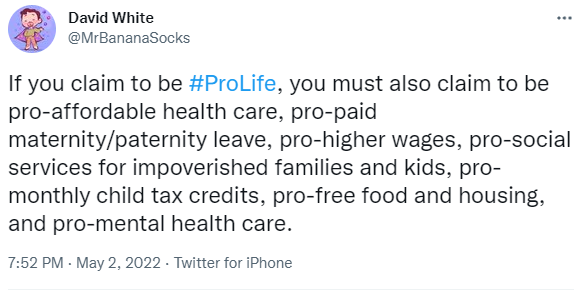The Long View: The Beginning of Wisdom

John J. Reilly had quite a few thoughts about constitutional law. It should come as no surprise that he had some thoughts on Roe v. Wade. In this essay from 2000, John makes an argument very much like that articulated by Christopher Caldwell’s Age of Entitlement, that both the Right and the Left of post-New Deal American politics became trapped in arguments that seek to make claims against the social order instead of shoring it up.
For want of a better term, let us call the common episteme of that era by Charles Reich’s term, Consciousness III. The Rightist version of Consciousness III became “libertarianism”: its chief effect has been on economic policy and public services. Its Leftist complement might be called “autonomy”: that found a home in cultural issues where, perhaps paradoxically, it played a major role in the development of equal-protection theory and group rights.
Thus, the application of either pole of this dynamic tends to weaken social order and political authority. But the two poles are also parasitically bound to each other, as you can see here:

In order to move forward, both poles must be repudiated, or perhaps synthesized into something that isn’t absurd and destructive. John believed very much in the principle that politics is how we are to order our lives together, and his proposal is cognizant of the various and sundry places that Americans found themselves in. But he managed to allow for that without any compromise of his very Catholic morals. Hearken.
The Beginning of Wisdom
by John J. Reilly
Half the reason we are still talking about abortion in this presidential election cycle is that the American people are genuinely divided about the question. This is an extraordinary fact. Almost 30 years after the Supreme Court sought to preempt discussion of the matter, "the right to choose" shows no sign of becoming a given in American politics. This kind of controversy cannot go on for ever, of course, and I for one have no real doubt about how it will turn out.
Abortion on demand is a grave moral evil that coarsens the emotions and corrupts the conscience of everyone associated with it. The institutions and the areas of law, even the personalities of those dedicated to defending the current abortion regime tend to crumble under the effort to maintain what is, in essence, a lie. What began as one right among others becomes the foundational right, the only right, before which the claims of free speech, medical science and the orderly operation of government must fall. Eventually, the increasingly desperate effort will collapse, simply because it is as incompatible with human life outside the womb as human life within it.. The pro-life argument has Darwin on its side.
The other half of the reason we are still talking about abortion in this election cycle is that the Supreme Court, in its folly, pretty much decreed that we have to. For all but the last generation of American history, the federal government was genuinely neutral on the question. Except for the laws on the subject in the federal territories and some regulations in military hospitals, the federal government did not address the matter at all. When the Supreme Court created an abortion "right," however, it obligated federal officials to defend the practice of abortion and put pressure on them to subsidize it. For the first time, national politicians needed to devise abortion policies, much as they may have wished the whole thing would go away.
The fact is that the abortion question is not going to go away anytime soon; America really is of more than one mind about it. It is, however, entirely conceivable that abortion as such could cease to be a national electoral issue, even before the law changes. The discussion about abortion in professional associations and in state legislatures is entirely natural. The discussion in Congress and among presidential candidates, in contrast, is an accident, the product of a wrong turn in the evolution of constitutional law. That, rather than abortion per se, should be what the national political debate is about.
Readers probably do not need another extended rehearsal of the flaws in the Supreme Court's reasoning in this area. There are just two things to remember. First, Roe v. Wade would have to be overturned even if it were about double parking. The Court dispensed with the idea of a written constitution. It is, of course, possible to have a democracy without a written constitution, but not if the courts retain wide powers of constitutional review at the same time. Second, the "personal autonomy right" that the Court manufactured is legal kudzu. It implies not just a right to abortion, but to sell your organs, to commit suicide and to use recreational drugs. Probably it would make conscription unconstitutional.
At least in the matter of euthanasia, the Court has chosen to recoil from its own logic, but only at the cost of making even less sense than usual. It can continue to issue arbitrary decisions in this fashion, but it will be harder and harder to pretend that they are "law" in any serious sense. This is just not good enough, and the fact should not be hard to explain to the electorate. Certainly it should be easier to explain than the relative sanctity of different trimesters.
Unfortunately, examples of the way in which the abortion controversy has corrupted public discourse are easy to find in the favored strategies of the opposition. The beginning of wisdom is to deconstitutionalize the whole thing as soon as possible. Nonetheless, many of the supposed opponents of abortion continue to insist that nothing less than a constitutional amendment criminalizing almost all abortions will do. I say "supposed opponents," because it seems to me that the Right to Life Amendment is a more or less conscious evasion. If nothing less than an amendment will do, then nothing will do, because the chance of passage of such a measure is known to be virtually nil.
In any case, even if passage were possible, it would not be advisable. The Supreme Court's creation of a bogus constitutional right in this area was not just foolish but tyrannical. The Court sought to end a debate before there was a consensus. There is still no consensus, nor likely to be one for some years. A constitutional amendment would not be quite as tyrannical as the Roe decision, but it would get us no closer to a durable settlement.
And what would a durable settlement look like, after the Court finally caves on this matter and throws it back to the states? Some states will doubtless rush to enact harsh criminal penalties. This will be a mistake. Prosecutors will be reluctant to prosecute and juries to convict. The occasional maximum sentence will be advertised as an arbitrary miscarriage of justice. Far preferable would be a system that folded the question into professional ethics. Doctors who performed unauthorized abortions would be facing a few months' suspension of their licenses, a grave enough matter for people with malpractice insurance premiums to meet and old medical school loans to repay.
Many Americans might think that such a regime would be far too mild, while others would insist that any penalties at all would be an outrage. Whoever is right, we cannot decide until we and our legislative representatives can vote on it, and we cannot do that until we stop trying to make the Constitution do our work for us.
Copyright © 2000 by John J. Reilly



Comments ()